SSRI’M OK
Join Dr. Bijan Zarrabi, a resident psychiatry doctor at Harvard Medical School, and Macey Isaacs, a stand-up comedian, as they conduct insightful interviews with experts in the field of psychiatry. With the help of comedians, they navigate discussions on topics such as depression, anxiety, ADHD, and more, aiming to debunk misinformation and demystify mental health. Their goal is to destigmatize these issues through a blend of expertise and humor, making listeners feel understood and supported. After listening, you’ll hopefully realize, “Wow, SSRI’m OK.” *Serious side effects may include laughter. In rare cases, healing may occur.
Episodes

7 days ago
7 days ago
In the Season 2 finale of SSRI’M OK, psychiatrist Dr. Bijan Zarrabi and comedian Macey Isaacs dive into imposter syndrome and how it shows up in their careers and lives.
We reflect on:
Bijan graduating from psychiatry residency
What screening questionnaires really are
How imposter syndrome relates to this podcast
Our favorite moments from Season 2
What we’re excited about for Season 3
An episode that didn’t make the cut
A surprise phone call to Julian Stern (is he camera ready?)
Bijan tells us his Philz coffee order
Thank you for listening to season 2, and make sure you’re following the show to be notified when season 3 drops! Also, feel free to rate and review!
Go to PureYogaTexas.com/pure-yogatv to become a member today!
Art by Zoe Zakson
Music by Raul Garcia
Edited by Katie Hettenbach
Check out our website: ssrimokpod.com
Follow us on IG: @ssrimokpod
Contact us: ssrimokpod@gmail.com

Tuesday Jul 22, 2025
Tuesday Jul 22, 2025
In this episode of SSRI’M OK, hosts Dr. Bijan Zarrabi, a psychiatrist, and Macey Isaacs, a stand-up comedian, talk about social media and what it’s doing to our attention spans. From flashlight metaphors to memory recall, they explore how attention works, what “brain rot” really means, and how to use social media more intentionally.
They dive into the science behind attention, including why multitasking can actually make it harder to focus and how engaging with multiple forms of media at once might affect memory and sustained concentration. Macey and Bijan also talk about the difference between passively scrolling and deeply engaging with a book or movie—and why that difference matters for your brain.
They cover:
What is attention, and why your brain is like a flashlight
The limited, precious nature of attention
Why it’s so easy to procrastinate with social media
The concept of “brain rot” and whether it holds up
Passive consumption vs. immersive media
Research on media multitasking and attention
Is the problem the amount of time we spend on social media—or how we use it?
Tips and tools for more intentional use (including Opal and Brick)
The link between attention, memory, and even pupil dilation
Plus, Bijan shares a personal story about being sleepy at the wheel, and the episode ends with both hosts sharing what’s helping them feel “OK” these days.
Go to PureYogaTexas.com/pure-yogatv to become a member today!
Art by Zoe Zakson
Music by Raul Garcia
Edited by Katie Hettenbach
Check out our website: ssrimokpod.com
Follow us on IG: @ssrimokpod
Contact us: ssrimokpod@gmail.com
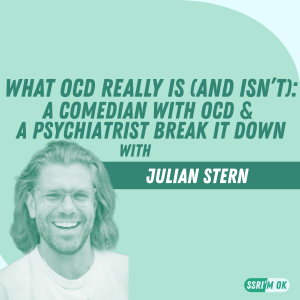
Tuesday Jul 08, 2025
Tuesday Jul 08, 2025
Our guest Julian Stern has a show in Los Angeles on Friday, July 18th at The Crow. If you liked this episode and are in the area, please go see him live!
In this episode of SSRI’M OK, hosts Dr. Bijan Zarrabi, a psychiatry resident, and Macey Isaacs, a stand-up comedian, are joined by comedian Julian Stern—who shows up a little late, but jumps right into the deep end with us.
Julian opens up about what it’s actually like to live with OCD—beyond the casual “I’m so OCD” comments people throw around. We talk about what OCD really is (hint: it’s more than just liking things tidy), the difference between obsessions and compulsions, and how anxiety and depression often tag along for the ride.
Julian shares what it was like to be diagnosed at 10 years old, and how his early compulsions involved Animorphs, ice cubes, and checking locks. As an adult, OCD shows up in different ways—praying on airplanes, ordering iced red eyes, and obsessing over social media posts. We also explore different types of OCD, including harm, checking, contamination, intrusive thoughts, and something called scrupulosity (yep, it’s real).
We dive into how OCD differs from general anxiety, how indecision can feel paralyzing, and what treatment has helped Julian manage it all—plus how comedy fits into the picture.
Go to PureYogaTexas.com/pure-yogatv to become a member today!
Art by Zoe Zakson
Music by Raul Garcia
Edited by Katie Hettenbach
Check out our website: ssrimokpod.com
Follow us on IG: @ssrimokpod
Contact us: ssrimokpod@gmail.com

Tuesday Jun 24, 2025
Tuesday Jun 24, 2025
In this episode of SSRI’M OK, hosts Dr. Bijan Zarrabi, a psychiatry resident, and Macey Isaacs, a stand-up comedian, are joined by their favorite comedian and skeptic, Matt Durndak, to talk about the Mediterranean diet—and why it’s one of the best things you can do for your mental health.
They break down what the Mediterranean diet actually is (spoiler: it’s more than just olive oil and red wine) and why it’s considered the healthiest diet in the world. They cover how it supports brain health by reducing inflammation through folate, omega-3s, and antioxidants—and yes, they explain what antioxidants actually are.
They discuss:
The SMILES trial and how diet can support depression treatment
How to get started with the Mediterranean diet (even if you're overwhelmed)
10 quick tips to make the switch more doable
Why gut health is so important—and how fiber and fermented foods play a role
What you should and shouldn’t eat (hint: whole wheat, not white bread)
If cheese and eggs are allowed (Matt eats six eggs for breakfast—so we get into it)
Whether you can lose weight on the diet
Why eating slowly, socially, and mindfully matters
Their favorite Mediterranean snacks
Also, plants should be at the center of your plate. And yes—red wine is okay in moderation.
Resources Mentioned:
https://www.thedoctorskitchen.com/
Go to PureYogaTexas.com/pure-yogatv to become a member today!
Art by Zoe Zakson
Music by Raul Garcia
Edited by Katie Hettenbach
Check out our website: ssrimokpod.com
Follow us on IG: @ssrimokpod
Contact us: ssrimokpod@gmail.com
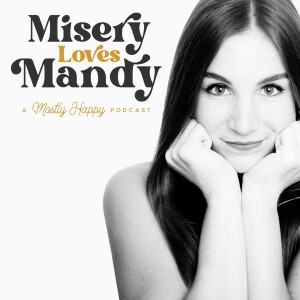
Tuesday Jun 10, 2025
Tuesday Jun 10, 2025
Here is a special bonus episode! Dr. Bijan Zarrabi and Macey Isaacs were guests on the podcast "Misery Loves Mandy" for episode number 146 titled "Misery Loves Mental Health." We loved it so much that we wanted to share it here on our feed. Below are the show notes taken from Misery Loves Mandy.
----
They are miserable about the stigma that antidepressants kill creativity, performance anxiety, and the struggle to stay productive without burning out. In this special episode of 'Misery Loves Mandy' for Mental Health Awareness Month, Mandy sits down with Macey Isaacs and Bijan Zarrabi, hosts of the podcast 'SSRI'M OK.' The discussion covers a wide range of topics, including mental health, depression, anxiety, and the stigmas associated with these conditions. Bijan, a psychiatrist, shares professional insights while the group also explores the intersection of mental health and creativity, how antidepressants affect people, and tips for achieving a balance between personal life and professional ambitions. Tune in for an engaging and informative conversation that also touches on personal anecdotes and the challenges of life in comedy. 🌟Support the pod and join us for Misery Loves Mandy Unfiltered in Patreon: / miserylovesmandy 📩 Email YOUR "Misery Loves Company" story to miserylovesmandypod@gmail.com
---
Go to PureYogaTexas.com/pure-yogatv to become a member today!
Art by Zoe Zakson
Music by Raul Garcia
Edited by Katie Hettenbach
Check out our website: ssrimokpod.com
Follow us on IG: @ssrimokpod
Contact us: ssrimokpod@gmail.com

Tuesday May 27, 2025
Tuesday May 27, 2025
In this episode of SSRI’M OK, hosts Dr. Bijan Zarrabi, a psychiatry resident, and Macey Isaacs, a stand-up comedian, talk about how to find a good therapist—even if you don't have insurance.
They break down the steps, starting with figuring out how you’re going to pay and whether you’re using insurance. If you're not, don’t panic—there are still affordable options like sliding scale therapists and training clinics.
Bijan shares insights from his recent trip to the APA (American Psychiatric Association) conference, including what he learned about mental health and social media. They also get real about how just starting the search is often the hardest part.
They discuss:
Tools that can help you actually sit down and start the process (like body doubling and setting timers)
How to choose a therapist based on your goals
Why ACT or CBT might be helpful—but why you shouldn’t stress too much about the specific modality
The importance of connection over credentials
Red and green flags to look out for
What to ask during a first call (which you should always do)
What Macey personally looks for in a therapist
Why it’s completely OK to prefer certain therapist traits—like gender, sexual orientation, or therapeutic approach
And a reminder that you’re not stuck with the first therapist you meet—you’re allowed to shop around
Also, Bijan has a great furrowed brow. That’s not helpful for finding a therapist, but it is true.
Resources Mentioned:
https://psychologytoday.com/
https://zencare.co
https://www.zocdoc.com/
https://www.therapyden.com/
https://therapymatcher.org/
https://openpathcollective.org/
https://www.focusmate.com/
Go to PureYogaTexas.com/pure-yogatv to become a member today!
Art by Zoe Zakson
Music by Raul Garcia
Edited by Katie Hettenbach
Check out our website: ssrimokpod.com
Follow us on IG: @ssrimokpod
Contact us: ssrimokpod@gmail.com
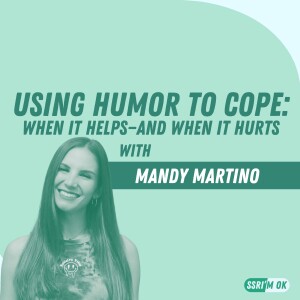
Tuesday May 13, 2025
Tuesday May 13, 2025
In this episode of SSRI’M OK, hosts Dr. Bijan Zarrabi, a psychiatry resident, and Macey Isaacs, a stand-up comedian, are joined by fellow comic Mandy Martino (from Misery Loves Mandy) to explore the psychology of humor:👉 Is humor always a healthy coping mechanism—or can it sometimes be harmful?
We dive into research on humor, mental health, and defense mechanisms, and explore how the jokes we make can reflect deeper emotional patterns.
Topics include:
Mandy’s childhood trauma (yes, involving hamsters) and how comedians often turn pain into punchlines
How using humor as a child can be a coping strategy—and whether that pattern evolves or gets stuck in adulthood
The "sad clown" archetype in comedy: from Chris Farley to cult classics like Superstar and Joe Dirt
Are comedians actually more mentally unwell than the average person?
Coping mechanisms vs. defense mechanisms: what makes a defense “mature” or “immature”?
Self-deprecating humor: why comedians use it, and when it becomes empowering—or toxic
How humor can be adaptive or maladaptive—and what to do if your humor style isn’t serving you anymore
We also talk about what it means to bring purpose to pain and how comedy can be a powerful tool for healing—but only if it’s rooted in honesty rather than avoidance.
🎧 Whether you’re a fan of stand-up, a therapist, or someone who jokes their way through hard times, this episode offers real insight into how and why we laugh—and what that laughter might be covering up.
Go to PureYogaTexas.com/pure-yogatv to become a member today!
Art by Zoe Zakson
Music by Raul Garcia
Edited by Katie Hettenbach
Check out our website: ssrimokpod.com
Watch on YouTube: https://www.youtube.com/@SSRIMOKPod
Follow us on IG: @ssrimokpod
Contact us: ssrimokpod@gmail.com
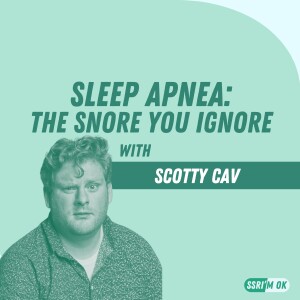
Tuesday Apr 29, 2025
Tuesday Apr 29, 2025
In this episode of SSRI’M OK, hosts Dr. Bijan Zarrabi, a psychiatry resident, and Macey Isaacs, a stand-up comedian, are joined by standup comedian Scotty Cav to talk about sleep apnea. Sleep apnea is surprisingly common, yet many people don’t even realize they have it. We break down exactly what sleep apnea is — a condition where breathing repeatedly stops and starts during sleep — and discuss the two main types: obstructive sleep apnea (OSA), the more common form caused by physical blockage of the airway, and central sleep apnea, which happens when the brain doesn't send the right signals to the muscles that control breathing. We also cover the serious health risks that can come with untreated sleep apnea, including high blood pressure, heart problems, and cognitive issues. Interestingly, sleep apnea can sometimes mimic symptoms of ADHD, making it even trickier to spot. We introduce listeners to the STOP-BANG questionnaire, a simple screening tool that can help identify potential sleep apnea risk. Scotty Cav shares his personal journey of undergoing a sleep study, getting diagnosed, and adjusting to life with a CPAP machine and mask. We also touch on different types of CPAP masks and explore alternatives for those who struggle with CPAP therapy. If you think you might be dealing with sleep apnea, this episode is a reminder to talk to your doctor and take the first steps toward better sleep — and better health.
Resources Mentioned:
https://jamanetwork.com/journals/jama/article-abstract/2764461
https://my.clevelandclinic.org/health/diseases/24443-obstructive-sleep-apnea-osa
https://www.ncbi.nlm.nih.gov/books/NBK459252/
Go to PureYogaTexas.com/pure-yogatv to become a member today!
Art by Zoe Zakson
Music by Raul Garcia
Edited by Katie Hettenbach
Check out our website: ssrimokpod.com
Follow us on IG: @ssrimokpod
Contact us: ssrimokpod@gmail.com
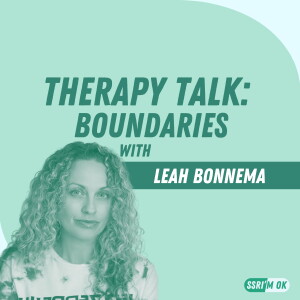
Tuesday Apr 15, 2025
Tuesday Apr 15, 2025
In this episode of SSRI’M OK, hosts Dr. Bijan Zarrabi, a psychiatry resident, and Macey Isaacs, a stand-up comedian, are joined by the hilarious Leah Bonnema (The Late Show with Stephen Colbert, Don’t Tell Comedy) for a deep—and deeply funny—conversation about boundaries. What are boundaries, anyway? They break it down with examples of physical, emotional, and time-based boundaries (yes, even Howie Mandel’s famous fist bump counts). They explore why boundaries are essential—not just for maintaining your own well-being, but for preventing resentment and burnout, and striking that delicate balance between your individual needs and the needs of others.
They also talk about the how: how to actually set a boundary using “I” statements, how to be consistent, and why it’s okay for boundaries to evolve over time. Plus, they unpack tricky territory like the weaponization of boundaries and how to tell the difference between a real boundary and just being selfish.
Leah also shares wild stories from her time growing up in rural Maine in the lawless ‘90s, and Bijan offers some practical tips for people pleasers who struggle with setting limits. It’s honest, funny, and might just give you permission to say “no” with love.
Resources Mentioned:
Mayo Clinic Health System – Setting Boundaries for Well-Being
https://www.mayoclinichealthsystem.org/hometown-health/speaking-of-health/setting-boundaries-for-well-being
UC Davis Health – Why Boundaries Matter for Your Mental Health
https://health.ucdavis.edu/blog/cultivating-health/how-to-set-boundaries-and-why-it-matters-for-your-mental-health/2024/03
Psychology Today – Setting Boundaries: Self-Care or Selfish?
https://www.psychologytoday.com/us/blog/meaningfull/202209/setting-boundaries-self-care-or-selfish
DBSA (Depression and Bipolar Support Alliance) – 8 Tips for Setting Boundaries for Your Mental Health
https://www.dbsalliance.org/support/young-adults/8-tips-on-setting-boundaries-for-your-mental-health
“Gift of Fear” by De Becker
Potato gun
Go to PureYogaTexas.com/pure-yogatv to become a member today!
Art by Zoe Zakson
Music by Raul Garcia
Edited by Katie Hettenbach
Check out our website: ssrimokpod.com
Follow us on IG: @ssrimokpod
Contact us: ssrimokpod@gmail.com
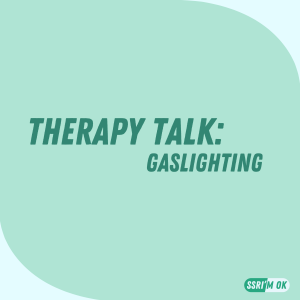
Tuesday Apr 01, 2025
Tuesday Apr 01, 2025
Warning: There is talk of Santa Claus in this episode. Listener discretion advised.
In this episode of SSRI’M OK, hosts Dr. Bijan Zarrabi, a psychiatry resident, and Macey Isaacs, a stand-up comedian, delve into the concept of gaslighting—what it actually means and why people do it. They start by breaking down the origin of the term “gaslighting” and how it got its name before exploring the many tactics people use to manipulate others in this way.
They also discuss what to do if you realize you’re being gaslit, the connection between narcissism and gaslighting, and how Taylor Swift’s “All Too Well” music video portrays emotional manipulation. To help listeners distinguish between a simple misunderstanding and actual gaslighting, they go through a practical checklist and highlight the importance of using “I feel” statements in difficult conversations.
Finally, Macey throws some real-life scenarios at Bijan, and he decides whether they qualify as gaslighting or not. Tune in for a mix of insight, humor, and practical advice on navigating manipulation in everyday life!
Resources Mentioned:
“Gaslighter” by The Chicks
https://www.thehotline.org/resources/what-is-gaslighting/
“All Too Well” Music Video
NAMI provides free, confidential help for mental health challenges. They can guide you to therapy, support groups, educational resources, and more.
Helpline: 1-800-950-NAMI (6264)
Website: nami.org
Crisis Text Line
If you’re in emotional distress or just need someone to talk to, you can text HOME to 741741 anytime, 24/7. You'll be connected with a trained crisis counselor for free, confidential support.
Website: crisistextline.org
Go to PureYogaTexas.com/pure-yogatv to become a member today!
Art by Zoe Zakson
Music by Raul Garcia
Edited by Katie Hettenbach
Check out our website: ssrimokpod.com
Follow us on IG: @ssrimokpod
Contact us: ssrimokpod@gmail.com








